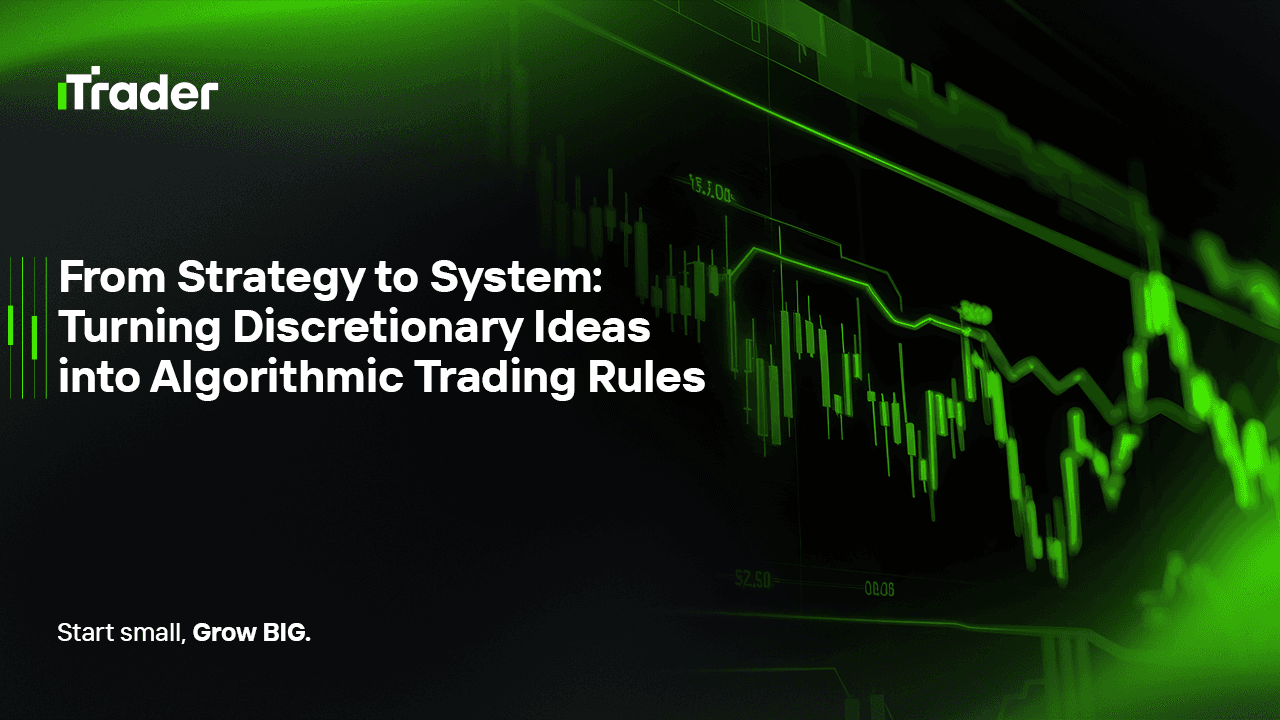2025-09-25
Most traders begin their journey by trading discretionary — relying on their eyes, instincts, and past experience to make decisions in the moment. There’s nothing wrong with that. In fact, many great insights are born from seeing patterns on a chart and trusting your gut.
But there’s a problem. Intuition doesn’t scale. It can’t be backtested. And when pressure mounts — especially under prop firm evaluation rules — emotions creep in, decisions change, and discipline slips.

That’s why serious traders eventually take the step from strategy to system: transforming their discretionary ideas into clear, testable, rule-based frameworks. In this article, we’ll look at how to make that shift, why it matters in the prop trading world, and what tools you can use to bring your trading to the next level.
Discretionary trading means you’re calling the shots in real time. You spot a pattern, read price action, maybe factor in the news, and decide: “This looks like a good entry.”
Systematic trading, on the other hand, is built on rules. Every trade follows predefined conditions, which means the strategy can be tested, measured, and even automated.
For prop firm traders, systematic approaches are a necessity. Firms don’t just care about making money — they care about risk control, discipline, and repeatability. A system gives you all three.
Every discretionary decision has hidden logic behind it. Maybe you saw price “reject” a level. Maybe you noticed momentum fading before a breakout. The key is to translate those observations into conditions that can be measured.
Example:
It’s the same insight — but expressed in a way that can be tested, repeated, and tracked.
To turn an idea into a system, think in components:
Each rule removes uncertainty and brings structure to your trading.
Once your rules are clear, they need proof.
A system isn’t proven until it survives both.
Not every trader wants to hand over all decisions to an algorithm. That’s fine. Many successful prop traders use hybrid systems:
This balance keeps discipline in place while still allowing for human judgment when it matters most.
Prop firms are strict about rules: daily loss limits, maximum drawdowns, position sizing caps. Without a system, it’s easy to break those rules accidentally. With one, you stay in line by default.
More importantly, systems deliver what prop firms value:
Turning ideas into systems is easier than ever:
You don’t need to be a programmer to start. Even partial rule-building makes your trading more disciplined.
Moving from discretionary trading to rule-based systems isn’t about losing creativity — it’s about bottling your insights into something repeatable.
The steps are simple:
The truth is this: good traders rely on instinct, but great traders systematize their instincts into rules that work under pressure. That’s the difference between passing a prop firm challenge and building a career in trading.
2025 Ай Трейдер Глобал ХХК | Компанийн бүртгэлийн дугаар: 15962
Ай Трейдер Глобал ХХК нь Комор улсын Анжуан арал дахь Мутсамуду хотын Хамчакод байрлалтай. Тус компани нь Коморын Үнэт Цаасны Хорооноос (Securities Commission of the Comoros) олгосон L15962/ITGL дугаартай тусгай зөвшөөрлийн хүрээнд үйл ажиллагаа явуулдаг.
Ай Трейдер Глобал ХХК нь “iTrader” нэрийн дор үйл ажиллагаа явуулдаг бөгөөд (Форекс) арилжааны үйл ажиллагаа явуулах эрхтэй. Компанийн лого, барааны тэмдэг, вэбсайт нь зөвхөн Ай Трейдер Глобал ХХК компанийн өмч юм.
Ай Трейдер Глобал ХХК -ийн охин компани болох : iTrader Global Pty Ltd, Австралийн компанийн бүртгэлийн дугаар (ACN): 686 857 198. Энэ компани нь Opheleo Holdings Pty Ltd компанийн албан ёсны төлөөлөгч бөгөөд Австралийн санхүүгийн үйлчилгээний төлөөлөгчийн дугаар: 001315037 -тай. Австралийн санхүүгийн үйлчилгээний лицензийн дугаар: 000224485 -тай Level 1, 256 Rundle St, Adelaide, SA 5000 хаягт байршдаг. Анхааруулга: Энэ байгууллага нь энэхүү вэбсайт дээр болон дамжуулан арилжаалагдаж буй санхүүгийн (арилжааны) хэрэгсэл нийлүүлэгч биш бөгөөд ямар нэгэн хариуцлага хүлээхгүй болно.
Эрсдэлийн сэрэмжлүүлэг: CFD арилжааны хөшүүргийн улмаас хөрөнгөө хурдан алдах өндөр эрсдэлтэй тул бүх хэрэглэгчдэд тохиромжгүй байдаг.
Фанд, CFD болон бусад өндөр xөшүүрэгтэй арилжаа нь хэрэглэгчээс нарийн төвөгтэй ойлголтуудын талаар тусгай мэдлэг шаарддаг. Хөшүүрэгтэй арилжаанд оролцогчдын 84.01% нь алдагдал хүлээдгийг судалгаанууд харуулдаг тул хөшүүрэгтэй арилжаанд орохоос өмнө хөрөнгөө алдах маш өндөр эрсдэлтэй болохыг анхаарна уу.
iTrader нь аливаа иргэн, хуулийн этгээдийн өмнө xөшүүрэгтэй арилжааны эрсдэл, алдагдал, бусад хохирлыг бүхэлд нь хариуцахгүй болохыг мэдэгдэж байна.
Энэхүү веб сайтын мэдээ, мэдээлэл нь зөвхөн мэдлэг түгээх зорилготой тул хэрэглэгч та бие даан шийдвэр гаргана уу.
Хязгаарлалт: iTrader нь вэбсайт болон үйлчилгээгээ тухайн орны хууль тогтоомж, дүрэм журмаар хориглосон орнуудад оршин суугчдад чиглүүлдэггүй. Хэрэв та энэхүү вэбсайтыг ашиглахыг хориглосон оронд байгаа бол вэбсайт болон үйлчилгээг ашиглахдаа тухайн орны хууль тогтоомжид нийцэж байгаа эсэхийг шалгах үүрэгтэй. iTrader нь вэбсайтынхаа мэдээлэл бүх оронд тохиромжтой эсэхийг баталгаажуулдаггүй.
Ай Трейдер Глобал ХХК нь зарим улс орны иргэдэд үйлчилгээ үзүүлэхээс татгалздаг болно. Жишээлбэл: АНУ, Орос, Бразил, Канада, Израйл, Иран.